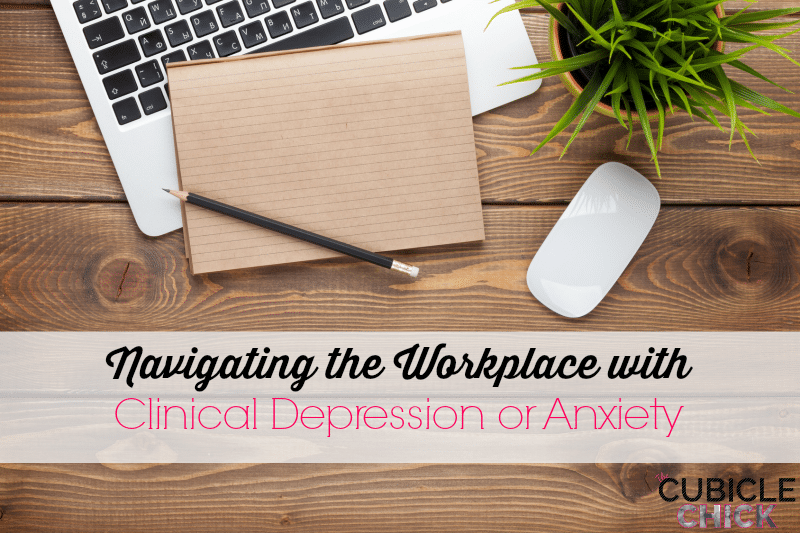May is Mental Health Month, so I thought this post would be fitting for those who are dealing with clinical depression or anxiety while at work. Please read and share with your feeds.
NOTE: If you are having symptoms that might be associated with clinical depression or anxiety, please visit Mental Health America. They have screening tools that can help you get a better understanding of your symptoms. (A diagnosis would have to come from a health professional.) Some information is provided on the page to help you figure out which test to take.
It’s very likely you or someone you know are dealing with mental health issues. According to Mental Health America, a non-profit focused on helping Americans achieve and maintain mental health, at least 1 out of 5 Americans will need help to achieve mental wellness at some point in his or her lifetime. Since May is Mental Health Awareness Month, it is a fitting time to look into effectively navigating the workplace when a mental health condition negatively impacts work performance.
When mental health declines, many suffer in silence to avoid being judged by others. This is especially true in the workplace. In addition to being worried about stigma, there is the added concern about the opinions of co-workers and perhaps even being fired. The stigma has lessened over time, but it is still a real and valid concern. Some workplaces are supportive, but that is not the case for all.
Does this mean that a mental health diagnosis is the kiss of death for a career or a job? Not by any means! Being proactive can help you minimize or even avoid any significant mishaps over the course of your career. Here are a few options to keep in mind for others or even yourself if you need assistance:
- Contact EAP. EAP (Employee Assistance Program) is a great resource offered by many companies. This resource is often utilized to support an employee through personal difficulties to minimize the negative impact on her performance. The confidential services are often offered at no charge to the employee.
- Visit Human Resources. If your company does not offer EAP, HR might have to be your first stop. If a change in some aspect of your workplace or duties can help you maintain productivity, they might be able to help. Boston University’s Center for Psychiatric Rehabilitation has guidelines available about talking to HR for assistance.
- Know Your Rights. The Americans with Disabilities Act covers employees with physical and mental disabilities. While it provides some protection for you, the law has some limits and is difficult to understand. Here are some facts about the ADA from the U.S. Equal Employment Opportunity Commission website.
If you or someone you know can benefit from this information, please seek help ASAP. If treatment is received early, the negative impact can be greatly minimized. Confide in a trusted family member or friend, if you are suffering. Encourage your friend or family member to talk to you, if you believe someone else is suffering. Research the symptoms, and make arrangements for appropriate treatment.
Author Bio: Dawn Hilliard is a freelance writer and web search guru. She is a huge fan of Esperanza Spalding, Mediterranean cuisine, and coffeehouses. She can be contacted at hilliardfreelance@gmail.com.





 #birthdaybehavior
#birthdaybehavior


 #valentinesday
#valentinesday

















Interesting post. I’m currently battling depression and work is becoming more and more unbearable. I’m not sure I want to talk to anyone in HR unless I could get a leave of absence.
Kim, actually you should talk to HR. You can get what’s called a Stress Leave if you are suffering from depression or other issues. If your job also has an EAP, you could get counseling/help at no charge through that program. It is illegal for your job to fire you or penalize you for getting help through the EAP or taking Stress Leave. I know it may not be something you want to do, but it can really assist you at this time.